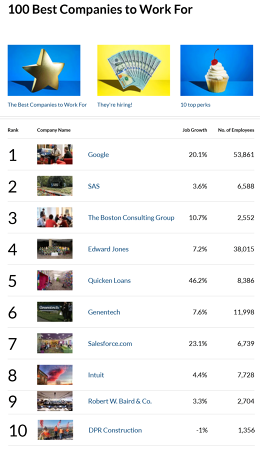At Fast Company, we try to crack the code on what makes a business succeed or fail. It’s a complex mix of culture, strategy, vision, and values.
We’ve chronicled how to bake in success with each hire, the ways in which keep their organizations humming with positive vibes, the transformative power of feedback, as well as how internal competition can crush a staff.

We’ve found that all the roads that lead to innovation also light the path towards creating a great place to work. Which is why we were intrigued by the list of the Fortune 100 Best Companies to Work for in 2014. The list, released by Great Place to Work, culled survey data from 257 companies and evaluates responses based on employees’ perceptions of trust, respect, compensation, camaraderie, internal communication, training, and diversity efforts.
Trust and engagement are particularly noteworthy traits among the top 100. Great Place to Work found that not only did these key elements make staff happier, they were 87% less likely to leave. This has a direct impact on the bottom line as less turnover means there’s no need to spend money and time recruiting and training new hires. If you’re looking for a stock tip, look no further than the publicly-traded companies publicly-traded companies on the list. Analysts found that they consistently outperform major stock indices by 300%.
There are other, more subtle ways these companies stand out.
1. They Provide Opportunities For Growth
One of the cardinal rules of keeping staff satisfied is to provide opportunity for change. China Gorman, CEO of Great Place to Work says, “One of the most staggering statistics we found is that the 100 best companies offer nearly double the hours of on-the-job training to full-time, salaried employees as companies not on the list.”
Mentoring programs, job rotations, global assignments, and peer support groups are just some of the ways companies design ways to help employees advance their careers. Gorman points out how Mercedes Benz USA offers a job rotation program to help associates understand their career interests and develop strengths alongside a personal enrichment program to give administrative assistants the opportunity to develop skills by working in other areas of the company.
QuikTrip, a midwestern chain of gas stations and convenience stores, offers career counseling to all its employees, says Gorman. “The employee and their manager respond to a questionnaire about the employee’s strengths and interests. Both then meet with an HR Mentor and develop a plan to support the employee’s career aspirations, even if those aspirations reside outside of QuikTrip,” she explains.
Several companies use internal career development to keep staff moving up the ranks. Nugget Markets, a California-based grocer, sees nearly 100% of job openings filled through internal promotion, while Baptist Health South Florida identifies successors for chief nursing office after going through their Nurse Executive Academy. “This program has helped Baptist identify “ready now” and “ready with development” candidates for this critical role,” says Gorman.
2. They Consider Succession Planning
Though all the companies on the list have some sort of succession planning strategy in place, Gorman says Bright Horizons, a provider of day care solutions and kindergartens, is one of the most notable.
“What is brilliant about it is how it integrates with their career development program,” she explains, “Every employee throughout the organization is assigned rating and plotted on a grid tracking their readiness for promotion.”
This so-called 9 Block Succession Planning Program keeps the organization nimble by allowing Bright Horizons to fill leadership positions quickly and keep a strong executive pipeline, she says.
At Hilcorp Energy, rapid growth made it necessary to identify up and coming executives. Senior leaders meet quarterly to conduct several different kinds of assessments on potential candidates. The result says Gorman, Hilcorp promoted 30% of their succession candidates in 2011. “While external candidates may have the technical skills needed, Hilcorp’s current employees have the values alignment that will enable them to rapidly excel,” she says.
3. Their Values Are Integrated In Their Culture
Gorman notes that the top five companies for 2014 list have monopolized those coveted rankings for some time. But that’s where the similarity ends. “While Google has garnered a lot of attention for being quirky, no one would use that term to describe SAS or BCG,” she observes.
Regardless what their corporate values are, Gorman says the top ranked companies score high marks for integrating them in everything they do, from hiring to setting strategy, to setting up rewards and recognition programs.
Detroit-based Quicken Loans counts nearly a third of its hires from internal referrals, “People who already know about the culture from their friends and families,” she adds. Quicken’s chairman and CEO invest their own time to train new hires in industry know-how as well as the company’s 19 value tenets that include behaviors such as “do the right thing.”
Because of this top down delivery, says Gorman, newly minted staffers get a sense that their leaders believe it’s worth their time to make this kind of investment in its people. “When Quicken remained standing as their competitors fell during the recent meltdown, that commitment to culture certainly provided dividends,” Gorman says.
4. They Let Ideas Trump Seniority
When junior and senior professionals work side by side, there’s a lot to learn and share. Gorman points to Boston Consulting Group (BCG) which encourages non-hierarchical interactions in several ways. In addition to office design, employees are organized around case teams which often have more senior employees working side-by-side with junior employees, pancake breakfasts, and dinners. “There is even a program that reimburses interns and new associates for taking partners to lunch,” she says, “All because BCG values ideas, not seniority.”
via 4 Strategies of America’s Best Places to Work | Fast Company | Business + Innovation.
4 Strategies of America"s Best Places to Work
